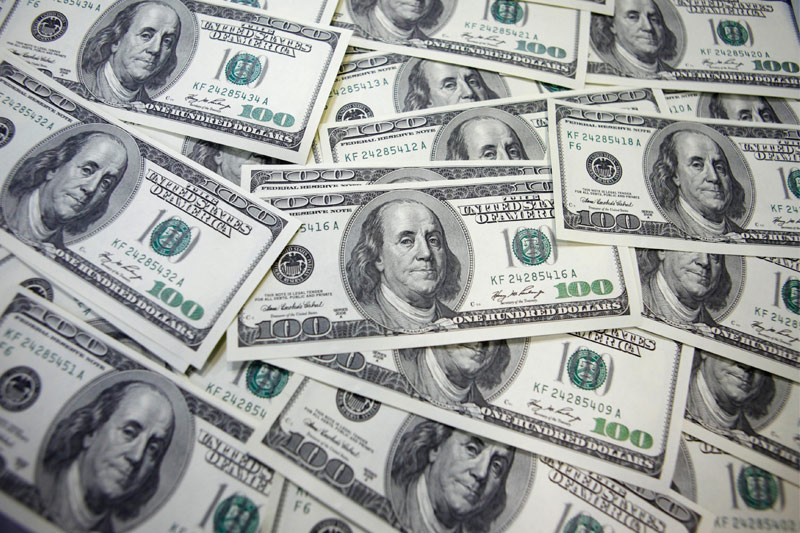Investing.com - The dollar rose against most major currencies on Friday after the U.S. laid out a case to attack Syria with limited missile strikes, while solid U.S. economic indicators bolstered the greenback as well.
In U.S. trading on Friday, EUR/USD was down 0.19% at 1.3216.
The Thomson Reuters/University of Michigan revised consumer sentiment index for August rose to 82.0. from a reading 80.0 in July, beating expectations for an uptick to 80.5.
Elsewhere in the U.S., a widely-watched Chicago purchasing managers' index rose to 53.0 this month from 52.3 in July, in line with expectations.
Friday's data rekindled expectations that the Federal Reserve may begin to taper its USD85 billion monthly bond-buying program in September as opposed to later in the year.
Monetary stimulus tools such as Federal Reserve asset purchases weaken the dollar by driving down interest rates, and talk of their dismantling strengthens the greenback.
Also Friday, the Bureau of Economic Analysis revealed that personal spending rose slightly less than expected in July, expanding 0.1% after an upwardly revised 0.6% increase the previous month. Analysts were expecting personal spending to rise 0.3% last month.
Geopolitical concerns gave the dollar a boost as well.
Earlier Friday, U.S. Secretary of State John Kerry said the U.S. and others were confident Syria recently used chemical weapons in its civil war though President Barack Obama said any decision to attack, if taken, would be swift and narrow with no boots on the ground in Syria.
Across the Atlantic in the euro zone, official data revealed that the bloc's consumer price index expanded 1.3% in August compared to 1.6% in July, just shy of market expectations for a 1.4% inflation rate
The euro zone's unemployment rate remained unchanged at 12.1% in July, in line with expectations.
The greenback was up against the pound, with GBP/USD down 0.08% at 1.5493.
The dollar was down against the yen, with USD/JPY down 0.20% at 98.16, and down against the Swiss franc, with USD/CHF trading down 0.05% at 0.9305.
While the dollar rose against most other currencies, it weakened against the yen.
Past and present rounds of Federal Reserve asset purchases have weakened the dollar and strengthened emerging-market currencies, though fears have grown that an end to ultra-loose monetary policies in the U.S. may roil currencies elsewhere, which sparked safe-haven demand for the liquid yen on Friday.
The dollar was up against its cousins in Canada, Australia and New Zealand, with USD/CAD up 0.02% at 1.0537, AUD/USD down 0.32% at 0.8901 and NZD/USD trading down 0.47% at 0.7734.
The dollar index, which tracks the performance of the greenback versus a basket of six other major currencies, was up 0.13% at 82.12.
U.S. markets will be closed on Monday for the country's Labor Day holiday.
In U.S. trading on Friday, EUR/USD was down 0.19% at 1.3216.
The Thomson Reuters/University of Michigan revised consumer sentiment index for August rose to 82.0. from a reading 80.0 in July, beating expectations for an uptick to 80.5.
Elsewhere in the U.S., a widely-watched Chicago purchasing managers' index rose to 53.0 this month from 52.3 in July, in line with expectations.
Friday's data rekindled expectations that the Federal Reserve may begin to taper its USD85 billion monthly bond-buying program in September as opposed to later in the year.
Monetary stimulus tools such as Federal Reserve asset purchases weaken the dollar by driving down interest rates, and talk of their dismantling strengthens the greenback.
Also Friday, the Bureau of Economic Analysis revealed that personal spending rose slightly less than expected in July, expanding 0.1% after an upwardly revised 0.6% increase the previous month. Analysts were expecting personal spending to rise 0.3% last month.
Geopolitical concerns gave the dollar a boost as well.
Earlier Friday, U.S. Secretary of State John Kerry said the U.S. and others were confident Syria recently used chemical weapons in its civil war though President Barack Obama said any decision to attack, if taken, would be swift and narrow with no boots on the ground in Syria.
Across the Atlantic in the euro zone, official data revealed that the bloc's consumer price index expanded 1.3% in August compared to 1.6% in July, just shy of market expectations for a 1.4% inflation rate
The euro zone's unemployment rate remained unchanged at 12.1% in July, in line with expectations.
The greenback was up against the pound, with GBP/USD down 0.08% at 1.5493.
The dollar was down against the yen, with USD/JPY down 0.20% at 98.16, and down against the Swiss franc, with USD/CHF trading down 0.05% at 0.9305.
While the dollar rose against most other currencies, it weakened against the yen.
Past and present rounds of Federal Reserve asset purchases have weakened the dollar and strengthened emerging-market currencies, though fears have grown that an end to ultra-loose monetary policies in the U.S. may roil currencies elsewhere, which sparked safe-haven demand for the liquid yen on Friday.
The dollar was up against its cousins in Canada, Australia and New Zealand, with USD/CAD up 0.02% at 1.0537, AUD/USD down 0.32% at 0.8901 and NZD/USD trading down 0.47% at 0.7734.
The dollar index, which tracks the performance of the greenback versus a basket of six other major currencies, was up 0.13% at 82.12.
U.S. markets will be closed on Monday for the country's Labor Day holiday.
